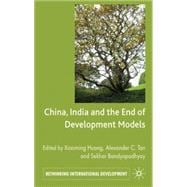
| List of Tables | p. vii |
| List of Figures | p. viii |
| List of Abbreviations | p. xi |
| Notes on Contributors | p. xiii |
| Introduction: Development Experiences and Development Models | p. 1 |
| Growth Paradigms of China and India: A Conventional Framework of Growth Analysis | p. 32 |
| A Supply-Demand Analysis of Economic Growth of China and India | p. 51 |
| One Economics, Many Recipes: An Institutional Approach to Explaining Economic Growth | p. 68 |
| From Dingzhou to Nandigram: Social Conflict, Party Society, and Inter-Governmental Dynamics | p. 82 |
| Regime Types, Political Change and Economic Development: The Cases of India and China | p. 99 |
| China and India: Education in Paths to Prosperity | p. 129 |
| Labor Movement and Economic Growth: Shaping and Managing the Lewis Transition in China and India | p. 150 |
| China's Economic Growth Engine: The Likely Types of Hardware Failure, Software Failure, and Power Supply Failure | p. 180 |
| Comparing National Sustainability in China and India | p. 218 |
| The "Living Wisdom" of China's Development Experience | p. 233 |
| Conclusion: The End of Development Models? | p. 255 |
| Bibliography | p. 267 |
| Index | p. 290 |
| Table of Contents provided by Ingram. All Rights Reserved. |
The New copy of this book will include any supplemental materials advertised. Please check the title of the book to determine if it should include any access cards, study guides, lab manuals, CDs, etc.
The Used, Rental and eBook copies of this book are not guaranteed to include any supplemental materials. Typically, only the book itself is included. This is true even if the title states it includes any access cards, study guides, lab manuals, CDs, etc.